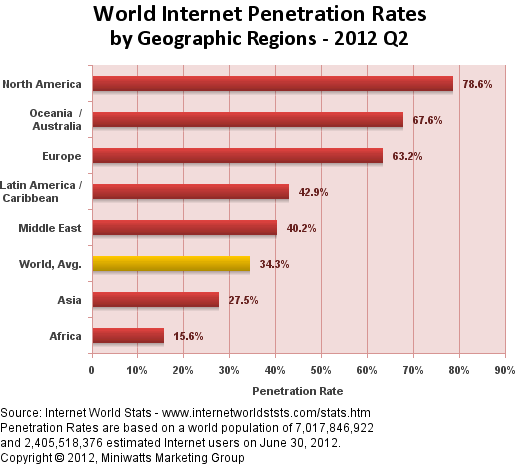The WSJ has reported that Google is participating in discussions with emerging markets such as Southeast Asia and Africa about setting up wireless network infrastructure in cities and towns. A source told the WSJ that: “The wireless networks would be available to dwellers outside of major cities where wired Internet connections aren’t available and could be used to improve Internet speeds in urban centers.”
This aligns with Google’s goals of surrounding the world with technology that fits into our daily lives. That’s a “don’t be evil,” touchy-feely notion, but it comes from a need to set up Google’s future business opportunities globally.
Remember, all of Google’s products require one thing: The Internet.
According to Internet World Stats, Africa’s “Internet penetration rate” was a paltry 15.6 percent as of June 2012. Compare that to 78.6 percent in the United States, and it’s clear that Google needs to move outside of the U.S. to go after its next group of “customers.”
That’s a lot of business opportunity.
Google Chairman and former CEO Eric Schmidt talks about Internet penetration a lot, projecting that by the end of the decade, everyone will be online: “For every person online, there are two who are not. By the end of the decade, everyone on Earth will be connected.” That’s lofty, but it’s essential for Google to grow.
Mobile phones prevail in areas that don’t have proper Internet connectivity, but smartphones are still limited. People still use laptops and desktops at work, and would possibly use them at home, if they had proper connectivity. When looking at the chart above, Google sees all of the possible business opportunities that would come into play once those penetration numbers start jumping up. With more people online, there would be more eyeballs, more ad clicks, more shoppers, more…everything. If Google can push a few of these projects through in Africa and Southeast Asia, it will attract support of governments in other locales, as well.
Google is working on rolling out connected Internet with its Fiber product in places like Kansas City, Austin and Utah. A quarter of Kansas City area residents don’t have Internet connectivity in the home, with 17 percent of them not using the Internet at all. These findings were unearthed during Google’s due diligence for setting up Fiber, of course. When I visited the area this month, Fiber hadn’t reached the homes that need it the most, the ones that would take advantage of the “free option.” That’s where things will get interesting for Google, as it will bring them engagement that they haven’t had and could lead them to building new products that they haven’t been thinking about yet.
If you take those learnings and the Fiber rollout in Kansas City and apply it to emerging markets, then Google’s intentions become clear: More people online, more people using Google products. It’s simple. What’s not simple is getting these markets to realize that it would not only be good for Google to have more people online, it would be great for local businesses as well.
While Google isn’t commenting, either for the WSJ story or this one, it’s clear that Schmidt is on a worldwide friend-making expedition, attempting to get as many global government officials on the “Internet For All” train that he can.
Sure, setting up these emerging markets will help Google’s potential bottom line, but it could also help the entire technology ecosystem. More opportunities for Google will open up more opportunities for those building apps and services. If Google wants to do all of the research and foot the bill to get things rolling, then everyone wins.
[Photo Credit: Flickr]

